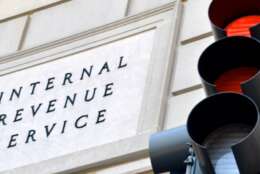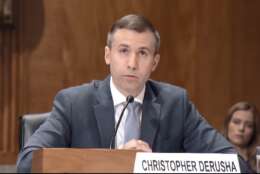Cybersecurity
-
Duncan Jones, head of Cybersecurity, and Tom Benjamin, president at Cambridge Quantum North America, join host John Gilroy on this week's Federal Tech Talk for a deep discussion on quantum computing and federal information technology.
February 07, 2022 -
The IRS will transition away from using facial recognition technology to help taxpayers create online accounts with the agency.
February 07, 2022 -
“With the adoption of many cloud-based technologies delivered via software as a service or infrastructure as a service, privilege access is expanding beyond the traditional IT admin role,” said Kevin Jermyn, the area manager for customer success at CyberArk.
February 07, 2022 -
In today's Federal Newscast, a group of lawmakers are banding together to create a new caucus focused on the fighter pilot community.
February 07, 2022 -
New strategy emphasizes enterprise cloud, software factories and process reforms, but specific fixes are still months away.
February 07, 2022 -
Brian “Stretch” Meyer, director of federal sales engineering at Axonius, said organizations need what might be called a longitudinal view that takes into account activity affecting a given cyber asset over time.
February 04, 2022 -
In the annual passback document, Federal News Network has learned the Biden administration wants to give federal employees their biggest raise in 15 years.
February 04, 2022 -
The so-called insider threat remains a potent one for cybersecurity practitioners. But old fashioned outside hackers have been raising their capabilities. Now they're the biggest threat to governments at all levels.
February 04, 2022 -
In today's Federal Newscast, immigration judges would no longer be part of the Justice Department, if a bill introduced in the House passes.
February 04, 2022 -
The Cybersecurity Maturity Model Certification program is moving to the CIO's office, while Katie Arrington's former role is being disestablished.
February 03, 2022 -
In today's Federal Newscast, most federal supply and service contractors and subcontractors have less than two months to certify that they are meeting their requirement to develop and maintain annual affirmative action programs.
February 03, 2022 -
Chris DeRusha, the federal chief information security officer, said the final zero trust strategy gives the federal government an opportunity to lead the conversation for how best to improve cybersecurity.
February 03, 2022 -
A new report says the Office of the National Cyber Director should lead a government-wide cybersecurity workforce strategy.
February 03, 2022 -
The name SolarWinds has become synonymous with a scary cybersecurity crisis. It's one of at least two widescale breaches to which the government had to respond. The other is when hackers showed they could get into and take over Microsoft Exchange Server. The Government Accountability Office took a look at the federal response to these two incidents.
February 02, 2022 -
Katie Arrington, the former top cyber official in DoD’s office of acquisition and sustainment, gained new information as part of a lawsuit, her attorney said.
February 02, 2022















